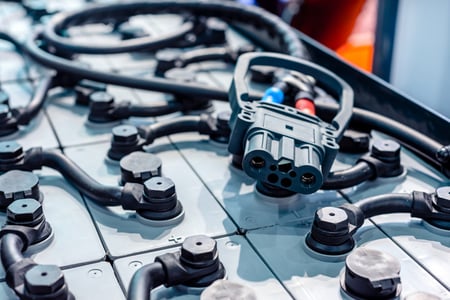 If your company has resolved to do better in terms of safety and environmental issues in 2020, you may be surprised that a switch from propane-powered forklifts to electric forklifts (powered by lead-acid batteries) can mean big advantages for your business. Lead-acid batteries are not only safer for your employees, they’re also safer for the environment and can help your business be more sustainable.
If your company has resolved to do better in terms of safety and environmental issues in 2020, you may be surprised that a switch from propane-powered forklifts to electric forklifts (powered by lead-acid batteries) can mean big advantages for your business. Lead-acid batteries are not only safer for your employees, they’re also safer for the environment and can help your business be more sustainable.
Why Not Propane?
You may be wondering why propane is such a popular choice for forklifts if lead-acid batteries are such an easy win, and the answer is simple: good fuel longevity and the ease of replacing the tank. In addition, for heavy usage/loads, especially with outdoor vehicles, customers tend to opt for propane. Propane does, however, come with some important disadvantages like fluctuating fuel costs that make budget forecasting difficult, and high maintenance costs, thanks to the engine’s many moving parts. Not to mention the fact that if your operators are switching out propane tanks earlier than when they are totally empty, you are paying for a lot more than you are using. However, the biggest disadvantages to propane forklifts are the environmental and safety issues that come with them.
Safety Issues with Propane
- The fuel tank can block the driver’s view when backing up, which is both a safety and a liability concern.
- Propane forklifts are generally more difficult to maneuver than electric forklifts because of their bulk, making the driver’s reaction time slower.
- There is always the possibility of a fuel leak on a propane truck, which is not only dangerous, but also means operators require special training in proper fueling and fuel line inspection.
Environmental Issues with Propane
- Propane forklifts do a poor job of converting fuel into consumable energy, which is a huge concern if your target audience is environmentally conscious and concerned about operating costs.
- Propane trucks generate anywhere from 10-40g of carbon monoxide per kWh. This means a high usage forklift would generate anywhere from 100-200+ lbs. of carbon monoxide per year. This doesn’t even take into consideration the amount of carbon dioxide generated as well.
- Propane truck fleets require warehouses to install large forced-ventilation systems, which further increase energy consumption.
- All the emissions add to the greenhouse effect and will increase your company’s carbon footprint.
- Propane is a non-renewable energy source.
Are Lead-Acid Batteries Really That Much Better Than Propane?
It may seem absurd that 160-year-old lead-acid technology comes out ahead of propane in terms of safety and environmental risks, but let’s take a look at how it stacks up.
Advantages of Lead-Acid Batteries
- Lead acid batteries are recycled at rate of 99%, and their recycled materials are used to produce new batteries. They are the #1 most recycled product in the world and result in a circular economy that generates environmental benefits.
- The price of lead batteries should stay steady and there is no risk that America will need to rely on other countries to supply them. As Dr. Matt Raiford, a manager at Consortium for Battery Innovation, said in an interview with Forbes, “Lead batteries have the advantage of being domestically sourced, which is important for both cost and national security, which is a priority for the Department of Energy (DOE).”
- Lead-acid technology has been around for a long time, but recently it has seen tremendous innovation. Technical advancements include the move from ferro/SCR chargers to high frequency chargers that increase dynamic charge acceptance and lifecycle performance. There have also been advances in the durability and life of the batteries themselves: battery life of lead acid alone has increased by 30-35% in the last 20 years. All of this makes a lead acid battery extremely reliable and flexible to meet each application’s demands.
Let’s face it: the technology to power your material handling equipment to drive your supply chain forward will always depend on your business needs. However, if safety and environmental awareness are concerns, lead acid is still close to 90% of the electric market. New innovations like lithium and hydrogen fuel cells, among others, are exciting but are still moving up the total cost of ownership vs. performance curve to meet the demands of most operations.
Are you using propane today? Concerned about the change management involved in getting your operators to plug up instead of swap out propane tanks? The first step is to evaluate if lead acid or another technology is a good fit for your plant is a power assessment. If it is, then working with the right partner to design the right system and help drive operator change management and training is critical.


 Ryan Lynch
Ryan Lynch
